First lady Melania Trump vows to fight cyberbullying despite skeptics

Pushing back against her critics, Melania Trump said Tuesday she’s committed to fighting cyberbullying despite the knocks she’s gotten for taking on the issue when her husband regularly uses Twitter to berate his foes and call them names. “I am well aware that people are skeptical of me discussing this topic,” the first lady said. “I have been criticized for my commitment to tackling this issue, and I know that will continue. But it will not stop me from doing what I know is right. I am here with one goal: helping children and our next generation.” Mrs. Trump made her comments as she convened executives from major online and social media companies at the White House to discuss cyberbullying and internet safety. The meeting came more than a year after she announced that cyberbullying would be her cause if Trump were elected president. The choice was immediately assailed, but Mrs. Trump said she won’t back down. She said she gets many letters from children who have been bullied or feel threatened on social media. She acknowledged that the issue has been studied for years, and told the executives she wants to hear “what you have learned, what has been accomplished, and what progress still needs to be made.” “I believe together we can make a real difference in encouraging positive behaviors on social media,” she added. Amazon, Snap, Facebook, Google, Twitter and Microsoft sent representatives, as did the Internet Association and the Family Online Safety Institute. All the major technology companies have strict policies prohibiting harassment and other bullying behavior on their services, but primarily rely on users to report abuses and weed them out. They try to clearly spell out the kinds of remarks and other posts that won’t be tolerated in special sections such as one Facebook, the largest online social network, has set up. Instagram, a popular service among kids and young adults for sharing photos and videos, provides links to the U.S. government’s anti-bullying site and tips from a cyberbullying research center on one of its help pages. But the efforts so far have fallen short, leading to rampant abuses that even some of the companies acknowledge have driven away or tormented portions of their audience. It got so bad on Twitter, which has 68 million U.S. users, that the San Francisco company vowed last fall to crack down on hateful tweets. Among other things, Twitter adopted new policies aimed at protecting women who unknowingly or unwillingly had nude pictures of themselves distributed online — a common bullying tactic. Yik Yak, another messaging app once popular among high school and college students, shut down last year partly because schools banned it following complaints about bullying and harassment. Online bullying takes many shapes, but some of the most common tactics include posting embarrassing or salacious photos, making demeaning or cruel remarks under a photo or in a general post about someone, and sharing screenshots of what at least one person thought was a private text. Harassment is widespread and extends beyond teenagers. A Pew Research Center poll last year found 41 percent of U.S. adults believed they had been harassed online. The popularity and volume of content on major social media sites presents a huge challenge in policing what is being shared. Facebook, for instance, has 2.1 billion worldwide users who collectively share billions of posts on their pages daily. More than 300 hours of video is uploaded to Google’s YouTube site every minute. The companies are also constantly struggling to balance the desire to prevent harassment and other abuses with a commitment to freedom of expression. In some cases, they see harassment and still look the other way. For instance, some of President Trump’s more vitriolic tweets have openly mocked and denigrated people, prompting calls for Twitter to shut down his account and ban him from its service. But Twitter has declined, maintaining the news value of the president’s tweets eclipses complaints about him being a bully. There is no federal law that applies to bullying. State laws vary, ranging from requiring public schools to have bullying policies to requiring anonymous reporting systems, said Sameer Hinduja, co-director of the Cyberbullying Research Center and professor of criminology at Florida Atlantic University. The federal government can best help by giving schools more tools and money to provide programs, Hinduja said. Mrs. Trump announced in a speech near the end of the 2016 presidential campaign that her priority as first lady would be to fight cyberbullying. Republished with permission from the Associated Press.
Jefferson, Mobile and Montgomery among 2 percent of counties that make up 51 percent of U.S murders

According to data from the Crime Prevention Research Center, 2 percent of counties in the nation make up 52 percent of murders throughout the nation. Alabama has three counties that make up part of that two percent; Jefferson, Mobile, and Montgomery. The state also had the third highest murder rate in the nation in 2016 with 407 murders out of a 4.8 million people population, giving the sate an 8.4 murder rate. According to the Alabama Law Enforcement Agency’s crime in Alabama report: In 2016 Jefferson county endured a total of 104 homicides, 78 of those taking place within the Birmingham city limits. The homicide rate was 15.69 per 100,000 people, and to put that in perspective, the national homicide rate was 5.3 per 100,000 people in 2016. Mobile county experienced a total of 61 homicides in 2016, 44 took place within Mobile city limits, and the homicide rate was 14.71 per 100,000 people. Montgomery county had the lowest number of the three, with only 31 total homicides, 30 taking place within Montgomery city limits. The county’s homicide rate was 13.76 per 100,000 people. According to the Crime Prevention Research Center: In 2014, the most recent year that a county level breakdown is available, 54 percent of counties (with 11 percent of the population) have no murders. 69 percent of counties have no more than one murder, and about 20 percent of the population. These counties account for only 4 percent of all murders in the country. The worst 1 percent of counties have 19 percent of the population and 37 percent of the murders. The worst 5 percent of counties contain 45 percent of the population and account for 68 percent of murders. As shown in figure 2, over half of murders occurred in only 2 percent of counties.” Murders actually used to be even more concentrated. From 1977 to 2000, on average 73 percent of counties in any give year had zero murders. Location is not the only factor in the concentration of murders; according to a 2013 PEW Research Center survey, gun ownership rates in rural areas were 2.11 times higher than in urban areas. In short, suburban households are 28.6 percent more likely to own guns than urban households. Most of the country has both very high gun ownership rates and zero murders. According to the data, murder isn’t a nationwide problem; and few people appreciate the large areas of the country where there are no murders. Researchers say that the problem lies within a very small set of urban areas, and the gun ownership, or lack of legal gun ownership, within those areas. To solve the problem, the Crime Prevention Research Center suggests focusing on the areas where murders are most common and doing what is necessary to reduce the amount of murders in that area. Here is the map detailing the counties in U.S. with highest murder rates:
Armed teacher bill on top of State House’s legislative calendar Tuesday

Alabama lawmakers in the State House will debate whether teachers can carry guns on campus when they return to session on Tuesday. Sponsored by Guntersville-Republican State Rep. Will Ainsworth, HB435 would allow some public school teachers and administrators to undergo firearms training and arm themselves during school hours, in order to help prevent school shoots like the one that occurred last month at Marjory Stoneman Douglas High School in Parkland, Fla. “Our children are sitting ducks in gun-free schools. As the parent of three public school students, I believe we must act now in order to prevent another tragedy,” Ainsworth posted on Facebook ahead of introducing the bill. House Democratic Leader Anthony Daniels said he’s disappointed the chamber is prioritizing the bill. “I am deeply disappointed the ‘Weaponizing Classrooms’ proposal is at the top of our calendar today,” said Daniels. “This proposal is a bad idea and would create dangerous policy. Putting loaded guns in our classrooms, and teachers even further on the front lines, will only pose greater danger to them and our students. The bill narrowly passed a committee vote last week before advancing to the full House, which Daniels considers a reason to have reservations about taking it up further. “As was clear during last week’s discussion in committee, this legislation raises far more concerns and questions than it answers. Members from both sides of the aisle and even Governor Ivey, a former schoolteacher herself, obviously have deep concerns and reservations,” Daniels added. “For the sake of our schoolchildren and teachers, we must do better to address these issues with proven proposals rather than knee jerk ideas like this.”
Women of Influence: Greater Birmingham Humane Society CEO Allison Black Cornelius
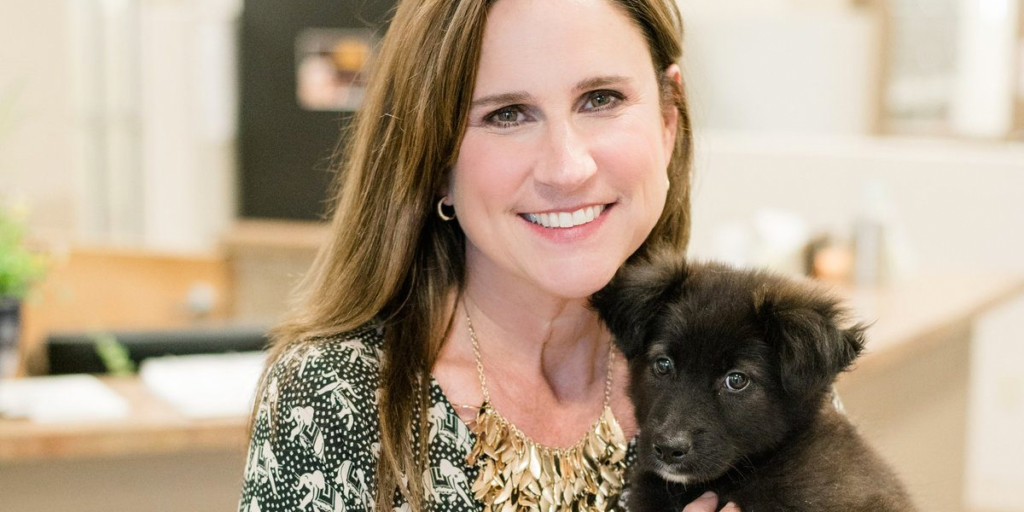
There’s no shortage of influential women doing amazing things in the Yellowhammer State and Birmingham’s Allison Black Cornelius is certainly one of them. The President and Chief Executive Officer at the Greater Birmingham Humane Society (GBHS), Cornelius is also the Founder and President of Blackfish, a consulting group specializing in “total team strategy” using organizational, staff, and board development programs. Cornelius has faced more than her fair share of adversity but has used it to fuel her work, and advocacy for those who can’t speak for themselves. A graduate of John Carroll High School, she received her nonprofit, and leadership education through the Harvard Business School Social Enterprise Initiative where she completed her MBA. Cornelius is a true testament to the resilience of the human spirit. When she was seven years old, she was molested and raped several times by her Sunday School teacher, Leon Prince over the course of three months. “Leon Prince doesn’t just rape you, he tortures you,” Cornelius told WSFA. Prince told her if she refused to do what he asked, or told anyone what he was doing that he’d kill her dog, so Cornelius stayed silent for 20 years. In 1988 Cornelius began the long, and arduous task of facing Prince and informing the world of what he had done. Prince was indicted and sentenced to 30 years in prison, of which he only served 15 years. “We were lucky for him to do 15,” she says. “It brought me 15 years where he didn’t mess with a kid. Now, we’re back to square one,” she told AL.com. Cornelius played a huge role in the court process, and the process of others; spearheading the passage of Megan’s Law in 36 states and creating the first Sex Offender Registry in the nation, and has founded more than 50 child advocacy centers around the country as well as Court Appointed Special Advocate (CASA) agencies. But she’s done so much more than that. Cornelius has been hard at work lately between the humane society and Blackfish, making over 150 presentations each year. She offers lectures and trains audiences, nonprofit organizations, government agencies and Fortune 500 companies on how to just “keep on swimming.” She has trained more than 1,000 nonprofit boards and raised more than $30 million for charity through these public presentations. Cornelius has traveled the world speaking; the year before she became CEO of the Humane Society, she traveled 265 of 365 days in the year. She’s given messages at the Kennedy Center, for professional sports teams, celebrity foundations, and the White House. She’s won several awards including: Birmingham 12 SMARTEST Women 2012, Animal Advocate of the Year, Citizen of the Year, Woman of Distinction, Mervyn H. Sterne Award, and was an Olympic Torch Relay Runner. Cornelius accepted the CEO position at GBHS in 2014, and has brought the company to a $4.5 million annual budget, operating three facilities, providing jobs for 80 employees. The humane society currently takes in over 23,000 animals each year, and that number is only growing. When Cornelius took over the humane society in 2014, one major source of income she sought was a government contract to take over the animal control in unincorporated parts of Jefferson County. The GBHS won the contract, and has been taking care of Jefferson County, including Birmingham’s stray animal problems since. She is currently concentrating on revitalizing the GBHS; which include plans to build a news $30 million facility located on land nestled between Titusville and will house all of the GBHS’s programs and services and provide more room for additional students from both Auburn and Tuskegee University’s. The facility would also contain a Cat Cafe, a growing trend in the U.S. From her extraordinary career despite the horrendous acts committed against her, her ability to turn her pain into advocacy for other, and her service to animal lovers in Birmingham, it’s indisputable why Allison Black Cornelius is this week’s woman of influence.
Steve Marshall praises Donald Trump’s opioid abuse initiative
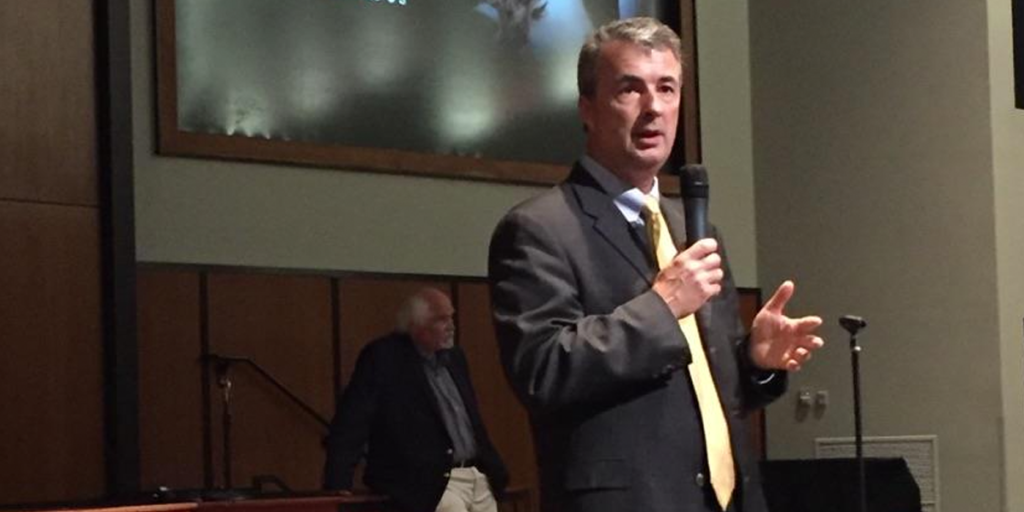
President Donald Trump on Monday announced a new initiative to stop opioid abuse and to reduce the drugs supply and demand. The president’s list of requirements for this initiative include: Reduce the over-prescription of opioids which has the potential to lead Americans down a path to addiction or facilitate diversion to illicit use. Cut off the flow of illicit drugs across our borders and within communities. Save lives now by expanding opportunities for proven treatments for opioid and other drug addictions. Alabama Attorney General Steve Marshall praised Trump’s initiative in a statement on Tuesday: I want to thank President Trump for his dedication to fight the terrible blight of opioid abuse in America. Opioid abuse is an epidemic that ignores cultural and political boundaries; it affects all of us—and thus demands a response that includes all of us. While I am still reviewing the specifics of President Trump’s initiative, I am heartened to see that his outline includes many of the recommendations of Alabama’s Opioid Overdose and Addiction Council; recommendations such as improved prescription monitoring, increased access to treatment and recovery support for persons suffering from opioid addiction, and legislation targeting low-dosage, super-lethal drugs like fentanyl. My hope is that, in the coming months, President Trump and Attorney General Sessions will work side-by-side with state and local officials to turn these ideas into reality. Together, we can conquer what the President has rightly called the ‘Crisis Next Door.’ In August of 2017, Gov. Kay Ivey named Marshall co-chair of the Alabama Opioid Overdose and Addiction Council. Ivey established this council to “develop and submit a strategic action plan to the Governor by December 31, 2017, which establishes recommendations for policy, regulatory and legislative actions to address the overdose crisis in Alabama. A request that was fulfilled by the council. Alabama’s plan includes four actions: Prevention Intervention Treatment Community Response Since 2016, Alabama has remained at the top of the list of states in the nation with an extremely high amount of opioid prescriptions. In fact, Alabamians receive more prescription opioids per person than residents of any other state in the country, according to the U.S. Centers for Disease Control and Prevention (CDC) — equating to a rate of 1.2 prescriptions per person. By comparison, the national per capita use was 0.71 in 2015.
Mike Huckabee stumps for gubernatorial candidate Scott Dawson
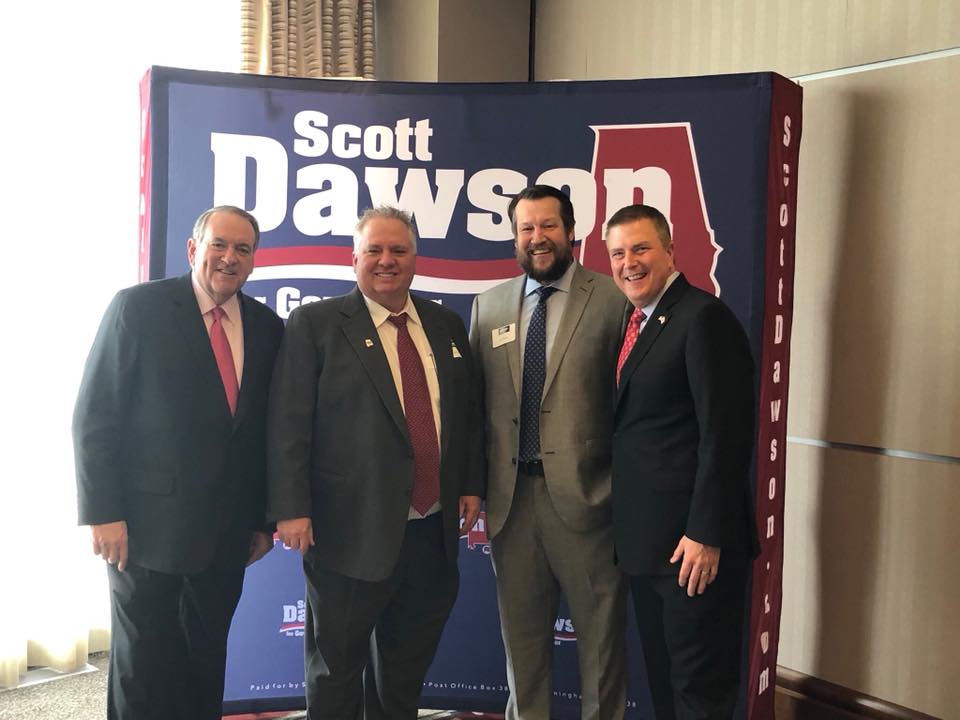
Mike Huckabee, former Governor of Arkansas and former candidate for President of the United States, joined Republican gubernatorial candidate Scott Dawson Monday night, along with Alabama radio personalities Rick and Bubba for a “Kickoff to Win Rally.” “What a joy to be here with the next Governor of Alabama, Scott Dawson,” Huckabee told the crowd as he walked on stage at the Pelham Civic Complex in Pelham, Ala. Huckabee explained if we’re to save the Republic, our country and states needs politicians willing to change the status quo. “I really believe we’re in a time in our country where we need disruptive personalities, who are willing and ready and able and committed to go and be different than the kind of politicians that we have had that have led us into a level of trouble that will end this great Republic if we don’t change the course of our country and our individual states,” stated Huckabee. Huckabee also said Dawson has the sort of humility voters should want in a political leader. “Here’s why I came… when I got to know Scott I realized here is a person who has something that very few people in political life have, humility,” added Huckabee “Real honest to goodness humility… He’s got an honest assessment of who he is. He doesn’t think he’s better than God thinks he is, or worse than God thinks he is. He just knows who he is and he’s willing to be that servant, that vessel, through whom the Lord can do something extraordinary.” Dawson will face incumbent Gov. Kay Ivey, Tommy Battle, Bill Hightower, and Michael McAllister in the June 5 Republican primary. The winner will go on to face the Democrat nominee in the general election, to be selected among: Tuscaloosa Mayor Walt Maddox, former state Supreme Court Chief Justice Sue Bell Cobb, Christopher Countryman, James Fields, Doug Smith or Anthony White. Watch Facebook live coverage of the event below:
Senators to preview proposals on improving election systems
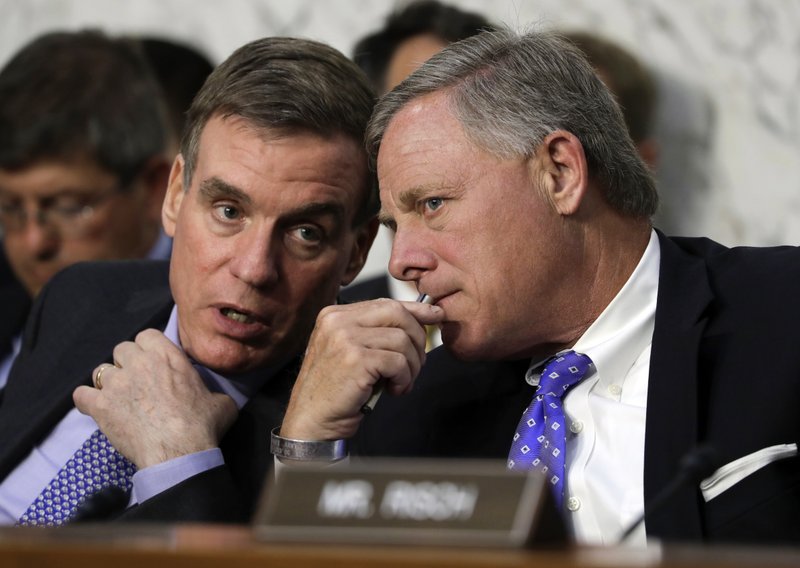
With the 2018 primary season already underway, leaders of the Senate Intelligence Committee are launching an effort to protect U.S. elections from a repeat episode of foreign interference. Senate Intelligence Committee Chairman Richard Burr, R-N.C., and Virginia Sen. Mark Warner, the top Democrat on the panel, will preview some of the committee’s recommendations for improving the nation’s election infrastructure at a news conference Tuesday. On Wednesday, the committee will hold a hearing examining attempted hacks on state elections systems in 2016 and the federal and state response to those efforts. The committee has prepared a larger report on the issue, one of what could be several reports to come out of the committee’s investigation into Russian meddling in the 2016 election. Burr and Warner have said this report is the most urgent because of the threat that it could happen again in 2018. It’s unclear when the full report will be released, but it is expected to include recommendations for elections officials around the country and also proposals for legislation to help ward off the hacking. Overall, experts say far too little has been done to shore up vulnerabilities in 10,000 U.S. voting jurisdictions that mostly run on obsolete and imperfectly secured technology. Russian agents targeted election systems in 21 states ahead of the 2016 general election, the Homeland Security Department has said, and separately launched a social media blitz aimed at inflaming social tensions and sowing confusion. Top U.S. intelligence officials have said they’ve seen indications Russian agents are preparing a new round of election subterfuge this year. There’s no evidence that any hack in the November 2016 election affected election results, but the attempts scared state election officials who sought answers about how their systems had been potentially compromised. DHS took nearly a year to inform the affected states of hacking attempts, blaming it in part on a lack of security clearances. Lawmakers in both parties have pressed the department on why it took so long. Warner has said he thinks the process to prevent such hacking needs to be more robust, especially since President Donald Trump has not addressed the matter as an urgent problem. “We’ve got bipartisan agreement we have to do something on this,” Warner said earlier this year. At the hearing Wednesday, former Homeland Security Secretary Jeh Johnson and current Homeland Security Secretary Kirstjen Nielsen will both testify. The Senate intelligence panel has put off making any assessments about whether Trump’s 2016 campaign in any way coordinated with Russia. Though that is one part of the panel’s investigation, Burr and Warner have decided to focus on less controversial issues where all members agree. Republished with permission from the Associated Press.
Kay Ivey signs controversial contract with prison health care provider
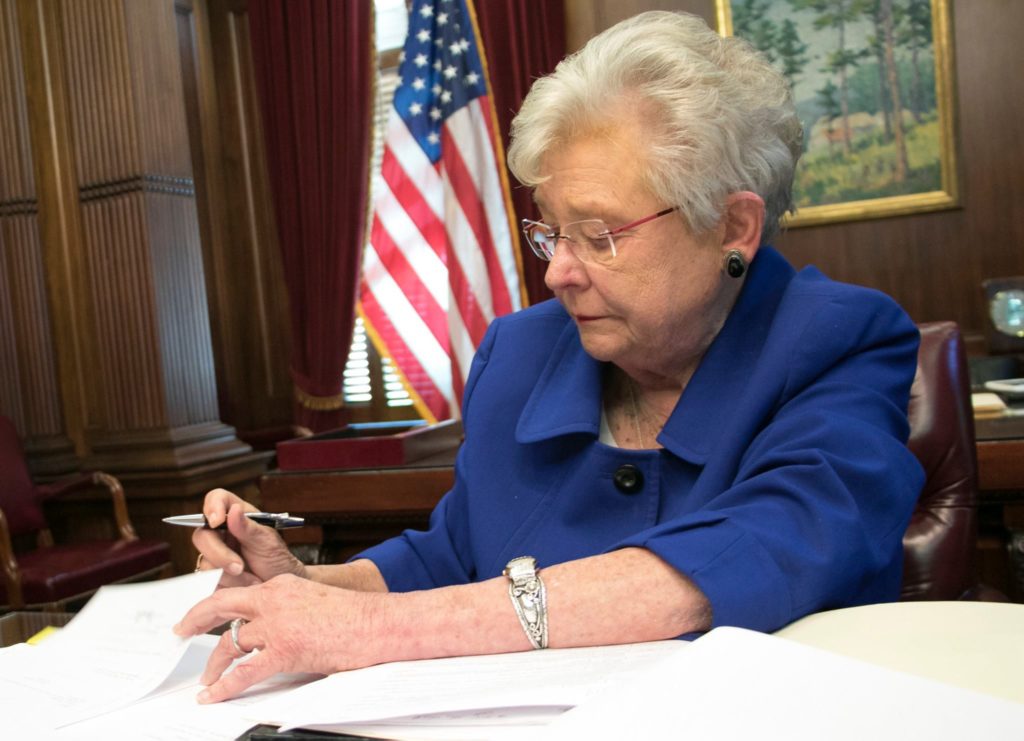
Gov. Kay Ivey has signed a controversial contract with for prison medical and mental health services for the Alabama Department of Corrections (ADOC) — with a company that is involved in a bribery case in neighboring Mississippi. The company, Wexford Health, was named in a suit brought forth by the Mississippi Attorney General Jim Hood to recoup funds and damages related to bribery charges that sent the former Mississippi Corrections Commissioner, Chris Epps, to jail for 20 years. Beginning April 1, Wexford “will provide comprehensive healthcare including both medical and mental health care and management services to State inmates in accordance to applicable laws” for 30 months — through Sept. 30, 2020 — for a sum of $360,471,062, which ADOC will pay. According to the Associated Press, Wexford had not been accused of any wrongdoing when the state decided to sign a contract with them. Which is why earlier this month a chairman of the state’s Legislature’s contract review committee, Vestavia Hills-Republican State Rep. Jack Williams, delayed the contract on March 1 to give Ivey’s office time to review it further and decide whether or not to stop it. “I held it up in order to give the governor’s office time to evaluate these others concerns that have been raised primarily from the state of Mississippi,” Williams said at the time. Ivey’s office has not returned a request for comment.
Alabama Power offers a reminder of power line safety
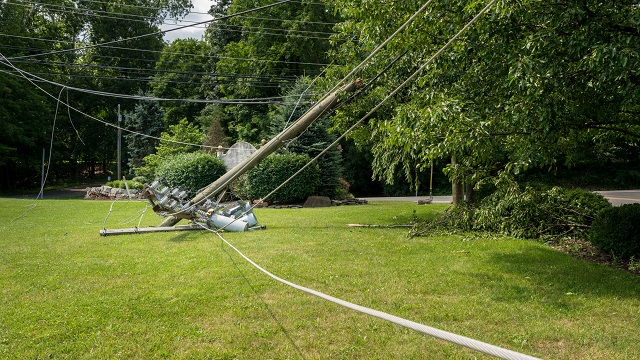
Power lines bring electricity from generating plants to our communities and into our homes. They are a vital part of the electrical transmission and distribution system. They can also be dangerous. There are reports of lines down in Alabama as the result of strong thunderstorms and suspected tornadoes that have passed through the state. It’s a good time to review what to do to stay safe around lines. Here are some basic rules about power line safety: Never climb power poles or transmission towers. A typical overhead distribution line has 7,200 volts per wire. Voltages on major transmission lines are as high as 500,000 volts. Both can deliver a deadly shock. Never climb trees near power lines. The human body is an excellent conductor of electricity and you could become its path from the lines to the ground. Stay away from downed power lines. Always assume a downed power line is live and life-threatening. Keep children and pets away from downed lines. Do not attempt to remove a person or animal caught in power lines. Call 911 for help. Do not attempt to remove tree limbs or any other object from a downed line. If you see a downed line, call Alabama Power at 1-800-888-2726 or your police or fire department to have the downed line barricaded until it can be repaired. Warn others to stay away. Never drive over a downed line or under a low-hanging line. Beware of downed lines touching a vehicle. Stay away from the vehicle and the line. If a power line hits your car while you’re inside, stay put and wait for help. If the car catches fire, then jump clear without touching metal and the ground at the same time. Shuffle away keeping both feet on the ground. Keep ladders, antennas, kites and poles away from power lines. Weatherproofing on overhead wiring is not insulation. If you are holding any of these items and they come into contact with a power line, you could receive an electrical shock.
‘Significant damage’ in Alabama after storms pummel Southeast
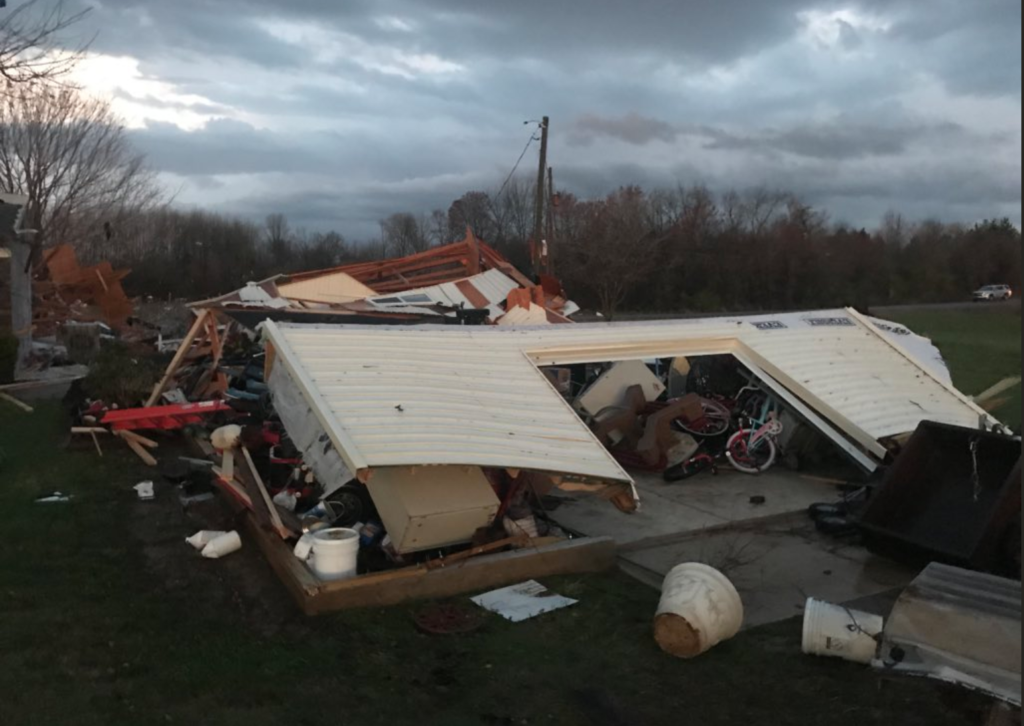
Severe storms pummeled the Yellowhammer State on Monday leaving destruction in its wake. After the night of violent weather, Alabama Power Co. confirmed more than 15,000 were without power throughout the night. As of 5:45 a.m., 9,000 homes and businesses still were. In Limestone County, Ala., the sheriff’s office tweeted photos of the the damage in Ardmore, Ala. showing several damaged homes and vehicles. Damage in Ardmore, AL pic.twitter.com/7mv3jmQMt3 — Limestone Sheriff (@LimestoneCoSO) March 20, 2018 Jacksonville State University, located in east Alabama, was one of the hardest hit locations in the state. There storms did major damage to the campus coliseum and several trees and power lines were downed. “We are still surveying all of the damage to campus and can confirm major roof damage to Logan Hall and Patterson Hall. Numerous trees and power lines are down. I’m very thankful JSU is on spring break this week and most students are out of town,” tweeted the university’s athletic director, Greg Seitz. We are still surveying all of the damage to campus and can confirm major roof damage to Logan Hall and Patterson Hall. Numerous trees and power lines are down. I’m very thankful JSU is on spring break this week and most students are out of town. — Greg Seitz (@gseitz) March 20, 2018 Seitz also tweeted a photo of the tornado that hit the university. Here’s a photo of the tornado that hit the Jacksonville State campus this evening. Please continue to keep us in your thoughts and prayers. pic.twitter.com/HV1eV514h2 — Greg Seitz (@gseitz) March 20, 2018 State Auditor Jim Zeigler took to Facebook to Monday morning sending prayers to those affected by the storm. He also posted photos of the damage from Jacksonville State. “So thankful to God that it was Spring Break when the tornado hit Jacksonville State University, and most students were not on campus. Look at these photos. Prayers for the injured and those who suffered damage. Prayers for the emergency personnel. Prayers for the local people,” Zeigler wrote. “So thankful to God that it was Spring Break when the tornado hit Jacksonville State University, and most students were not on campus. Look at these photos. Prayers for the injured and those who suffered damage. Prayers for the emergency personnel. Prayers for the local people” In a late night news release, Gov. Kay Ivey confirmed she is sending state resources to the affected areas across the state. “There has been significant damage tonight in parts of Alabama. We are sending state resources to those affected areas, especially to Jacksonville and Calhoun County. We will continue to monitor and respond to needs in other areas as needed,” Ivey said. She also warned Alabamians to stay out of the affected areas. “Our first priority is ensuring our people are safe. Please stay out of affected areas and let first responders do their job. I thank all first responders, EMA and Weather officials, and utility workers for their hard work trying to keep Alabamians safe,” Ivey added.

